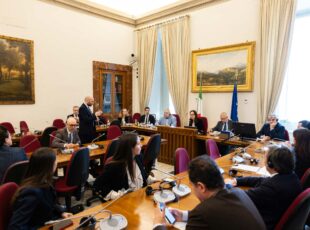U.S. and European Policymakers Recommit to Rights in Russia
 Leading U.S. and European policymakers say they are determined to deepen their support for human rights and civil society in Russia following the crackdown in recent months against the opposition by President Vladimir Putin.
Leading U.S. and European policymakers say they are determined to deepen their support for human rights and civil society in Russia following the crackdown in recent months against the opposition by President Vladimir Putin.
Commenting on the passage of the Magnitsky Act, Rep. James McGovern warned others in his own party in the administration that if bureaucrats failed to implement the law, the House would go back and draft an even stronger, tougher law. “If anybody is thinking of trying to weaken it, there will be a response by Congress,” he said. “This was not just a talking point that we passed, this was a piece of legislation in hopes of advancing the cause of human rights, so we are serious about making sure it is implemented fully.”
Meanwhile, Sen. Benjamin Cardin, the sponsor of the bill, reiterated the goals of the bill: “Our objective is simple. Our objective is not to ban Russians from visiting the United States or using our banking system. Our objective is to have the rule of law applied in Russia. Our objective is to get Russia to do what is right for its citizens. Our objective is to achieve change in Russia.”
The two lawmakers made these statements during the March 4, 2013 conference in Washington DC titled “New Approach or Business As Usual? US-EU-Russia Relations After Putin’s Crackdown,” which was organised by Freedom House, Foreign Policy Initiative, and the Institute for Modern Russia.
The event on the Hill, which was attended by a standing-room-only audience of several hundred attendees, featured the participation of the legendary human rights campaigner Ludmila Alekseeva, former Deputy Prime Minister Mikhail Kasyanov, and opposition Duma member Dmitri Gudkov, who came to Washington to share their observations of the worsening conditions for human rights and civil society since the return of Vladimir Putin to the presidency. A second panel featuring Members of European Parliament Kristiina Ojuland and Edward McMillan-Scott, as well as political analyst and author Lilia Shevtsova, who debated the Western policy response to events in Russia. Keynote remarks were delivered by Rep. McGovern, Sen. Cardin, Guy Verhofstadt MEP, while David Kramer (Freedom House) and Elaine Bork (Foreign Policy Initiative) served as moderators, and Pavel Khodorkovsky (Institute of Modern Russia) gave the closing remarks.
Alekseeva, Russia’s “grandmother of human rights” who was recently nominated for a Nobel Peace Prize by Sen. Cardin, said that new legislation by the Russian government requiring many civil society organisations to register as “foreign agents” was unacceptable and made operating in the country more difficult.
Prominent business figures have been scared and intimidated not to donate to NGOs by the Kremlin, said Alekseeva, lest they face seizures of property, or worse, treatment similar to that of political prisoner Mikhail Khodorkovsky.
“Despite this new bill, we will continue raising public awareness of human rights, and we refuse to label ourselves as ‘foreign agents’ because it is not true,” said Alekseeva.
Kasyanov similarly painted a very dark picture of the current reality in Russia, noting the total absence of standard features of a democracy, such as separation of powers, judicial independence, and especially a free media, however, he noted, “change in Russia is inevitable” as a response to the growth of a new middle class hungry for political renewal.
Dmitri Gudkov, whose father Gennady Gudkov was controversially stripped of his seat last fall, suggested that international figures should “help” President Putin. “He is always saying how much he wants to fight corruption, so we should present him with evidence of corruption in the Russian government.”
During the second half of the conference, the panelists discussed the need for a renewed Helsinki process to help overcome the difficult process of forming a coherent European policy on Russia. During his opening remarks, Guy Verhofstadt MEP said, “The international community seems to have thrown up a wall between itself and Russian internal realities, and if the governments are failing to do what is necessary, and they are, it is for the legislators and parliaments to speak the truth about Russia.”
Kristiina Ojuland noted the importance this year of the 10th anniversary of the arrest of Khodorkovksy, remarking how far Russia still has to go on improving human rights, requiring a stronger response from the international community.
Dr. Shevtsova was very critical of the argument from some sectors for more “patience” for Russia and transactional-based cooperation with Russia on issues like Iran, Afghanistan, and trade, emphasizing that this kind of realpolitik only can occur in the context of the West adjusting to conditions set by Russia to never talk about democracy or victims of human rights.
Other speakers were keen to avoid common misunderstandings arising from the Magnitsky Act and implementation of the Helsinki Principles. Sen. Cardin said, “Look, no country is perfect, every country can improve – I take pride in the fact that I have been critical of actions within the United States when I think it violates the principles of Helsinki Principles. But in Russia’s case, some of their recent conduct is difficult to understand.”



